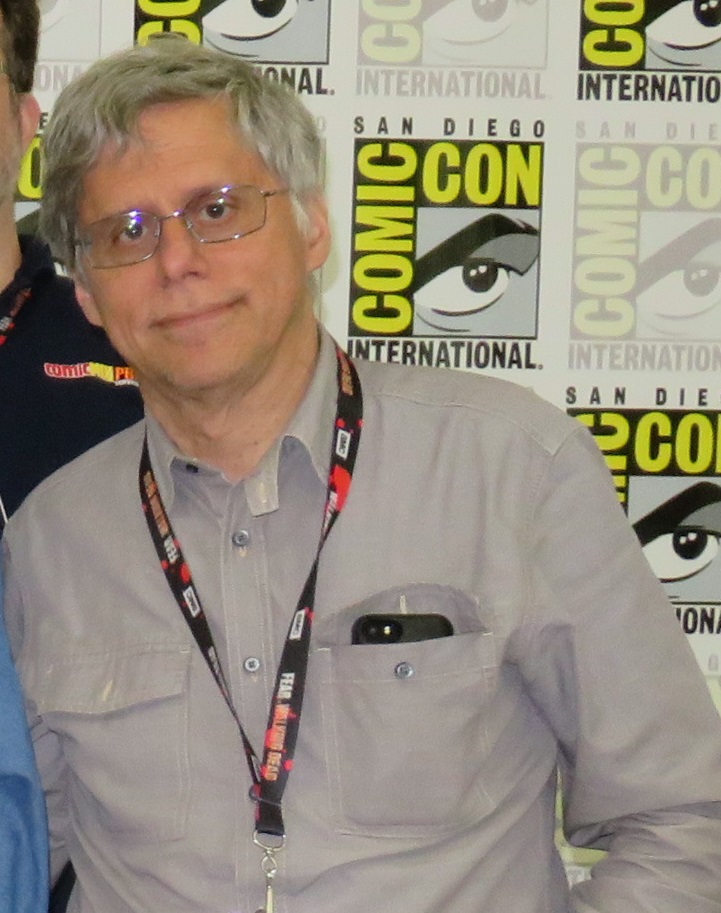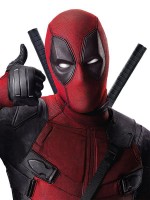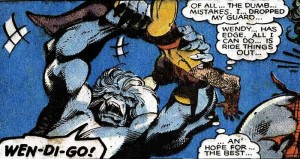Devin Grayson Interview
Originally published in March 1999. This was the first female comic creator I interviewed and I again wince at some of my questions. I was very happy to be interviewing her as all of my previous interviews were with men. For those with short memories Devin was in a relationship with Mark Waid at the time and she was falsely accused of getting and keeping work at DC Comics because of that relationship by assholes back in the day. Devin stopped writing comics after a while and I can’t say I blame her. I hope she’s happy doing whatever it is she’s doing today, she deserves it.
An Interview with Devin Grayson
The fastest rising hot writer in DC Comics is here. Devin Grayson has been wowing people with her Catwoman work and has recently gotten more spotlight with her JLA/Titans crossover, the new Titans series, and her upcoming work involving the Batman’s No Man’s Land event. With this interview we find out who Devin is, how she sees things and what she’s up to.
Jamie: You’ve said in the past you didn’t get interested in comics until you saw the Batman Adventures cartoon. What did you do before becoming a comic writer?
Devin Grayson: I went to college and took some post-graduate courses in writing while working on a novel which I have yet to complete (I got sidetracked by the comics!) and I had a day job as a project manager in the research division of a large Northern California HMO.
Jamie: Before breaking into DC Comics, what comics did you write?
Devin Grayson: None, actually. My interest was pretty limited to the Bat-verse (that is – I didn’t really want to “be a comic writer” I just wanted to write Batman and Nightwing and all of the cool Gothamites), and “Like Riding a Bike” in The Batman Chronicles #7 was my first professional work in comics.
Jamie: Did you ever have any association with the Friends of Lulu and do you have any opinions of female focused groups like that?
Devin Grayson: I am not a member of the Friends of Lulu, and don’t intend to become one, nor would I presume to generalize about female-focused groups (they can be assumed to vary widely, both in intent and effectiveness). All I can say is that for myself, personally, there’s a danger in joining such groups. My fear is that instead of actively doing things that challenge gender-bias, I would let “being a member” serve as my “good deed” – that is, I could begin to assume that my membership in and of itself was what I was doing to promote healthy gender politics and – let me emphasize this again — for myself, personally, that’s not the best way to effect change.
Jamie: Who are your writing influences?
Devin Grayson: In comics the writers I turn to most frequently for inspiration are Alan Moore, Neil Gaimen, and Frank Miller, though there are certainly a whole bunch of other people I admire and have learned from, including, among many others, Dennis O’Neil, Terry Moore, Chuck Dixon, Scott McCloud, and Mark Waid.
In other media, I’m deeply influenced by Milan Kundera, A.S. Byatt, Stendhal, James Baldwin, Tom Stoppard, David E. Kelly, Steinbeck, Shakespeare, Rilke, Anne Rice, Nabokov, Tori Amos, Terry Gilliam and then also by people like Jung, Joseph Campbell, Thomas Moore, and more recently Buddhist scholars like Pema Chödrön and Thich Nhat Hanh.
Really, though, the lovely thing about writing is that you’re constantly influenced by absolutely everything. My own psyche influences my writing more than anything else, and my psyche is a magpie.
Jamie: Are there any particular artists that you would really like to work with?
Devin Grayson: I’ve been very fortunate with artists. I’d love to do more with Greg Land and Brian Stelfreeze someday soon, and there are some wonderfully talented people out there who would be a lot of fun to work with, but I enjoy coming across people by chance – there’s no one in particular that I’m obsessing over right now.
Jamie: Are there any characters that you haven’t written yet that you want a crack at?
Devin Grayson: There really aren’t. Again, I’ve just been so tremendously fortunate. The characters I feel most attached to are the Bat-characters and the Titans- characters, and I’m lucky enough to have the opportunity to work closely with both.
Jamie: Avengers fans are confused as to why a new Black Widow is being created when there is a perfectly good one already in existence. Can you tell us the reason for the new Black Widow?
Devin Grayson: Um… because it’s a story element? Tell you what — a good remedy for being confused about something is to check it out. This would make more sense to discuss AFTER the miniseries comes out, no? 😉
Jamie: After reading The Titans it’s pretty clear you really know these characters and how they think and feel. But you’re not a long time comic fan, how did you “catch up”?
Devin Grayson: I read a whole bunch of stuff at once, instead of having to wait for the monthly to come out. It was great! I just brought up all the back issues I could get my hands on, until eventually I had them all, and then I read them straight through (after reading them out of order, actually, which was another thrilling exercise). What I lost was the anticipation of waiting for the next installment to come out, but the end result is that it’s probably fresher in my mind than in yours. You were probably reading The New Titans in the eighties, I was reading The New Titans two years ago!
Jamie: Now that the Titan lineup has been revealed, who are your favorite members?
Devin Grayson: Oh, I really can’t answer that, I’d make the characters jealous. 😉 The truth is that it’s a lot of fun to play with all of them, to juggle and watch them have their moments and shine in different stories.
Jamie: Comic fans on Usenet have been a hot topic lately, do you lurk on the newsgroups and have any opinions on them?
Devin Grayson: I don’t lurk, I don’t read newsgroup boards, and I have a personal policy against posting. I also don’t coddle professional friends who go onto the boards and then get upset about something they read there, I just tell them to get off the boards. I do have a website (2KComics.COM) where you can get information about what I’m working on, and an active email address that seems to allow people to contact me with relative ease (you had no trouble tracking me down for this interview, for example!).
As a newcomer to all of this, I find it a little disturbing just how accessible so many of the comic pros are, and accordingly, how entitled many fans feel to their attention – you don’t get mad at screenplay writer when he won’t show up in a chat to discuss his latest work, and you don’t demand that novel writers read your opinion of, or riffs on, their stories. I guess it stems from the fact that the majority of comic professionals were once fans themselves, so there’s a slightly more natural mutuality there than in the other media I mentioned, but that relationship also seems to foster some real serious jealousy and nastiness that really is a little bizarre when you step back from it. I think there are a group of pros who really like getting “strokes” from fans, so they put themselves out there, and after awhile that breeds familiarity and expectation. And if it works for them, great, but I don’t want to be held accountable to that. Personally, I don’t like receiving feedback about the work I’m doing while it’s still in progress, except from the editors, whose job it is to guide me and assess my work. I’d much rather do the work than talk about doing the work. And personally, I do find negative feedback hurtful to receive, and positive feedback distracting. Not to mention that so much of it gets so unnecessarily personal – after Wizard magazine ran a picture of me, a well-intentioned friend forwarded me some posts about whether or not I was “doable” and whether or not I needed to lose weight, and whether or not I could possibly actually be in love with my boyfriend. I mean, these were “threads”! And all I could think was, would these people say this stuff to my face? It’s not all like that, obviously, and I feel bad for all of the truly kind, well-meaning fans who get drowned out by this cacophony, but I’ll tell you – if even one person is posting things of that nature, why on god’s earth should I be held responsible for checking it out to “be in touch with my fans”? I absolutely refuse. There’s nothing in my job contract that says I have to be subjected to that. I’d rather do interviews like this, and enjoy the really nice experiences I have meeting fans in person at conventions, or receiving the frequently very kind and encouraging emails and letters they send.
I’ve always felt very grateful for the level of enthusiasm present is so much of comic fandom, but I think that there needs to be some space for fans to discuss whatever they want to discuss WITHOUT fear of hurting anyone’s feelings, and message boards seem like a good place for that. So I give myself the space I need to work and the fans the space they need to comment by staying away from all of it.
Jamie: Has your The Weinbergs been given a new title yet? If not what are some of the alternatives being suggested?
Devin Grayson: No, alas, we’re still in flux, and the book has now been pushed back for a December release –which is disappointing for me, since I’m excited about it and I really want it to be out there, but is in the long run a huge show of faith by DC. They want more time to market it, and also, our artist, Yvel Guichet, got the chance to work on a high-profile No Man’s Land assignment (the two-parter which introduces Harley Quinn which I saw some sketches for today – it’s amazing!), so I’m excited for him and pleased that more people will get a chance to see how remarkable his work is before The Weinbergs comes out.
The one other title we played around with was RV5: Relative Velocity, but I think somebody somewhere had concerns about that, so I’m not quite sure where we are now.
Jamie: How will The Weinbergs be different than other ‘kids with powers’ book like Power Pack?
Devin Grayson: As much as I enjoyed Power Pack, I don’t feel that the series have anything in common. I’ve been struggling to find an eloquent was of explaining this, but The Weinbergs doesn’t fit into any pre-existing genre I’m aware of. The Power Pack was an utterly charming tale of innocence wading through polarized alien forces of good and evil. The Weinbergs is very human, gently making fun of the superhero genre while absolutely revering and empowering it. The Weinys aren’t kids who find themselves suddenly blessed with magical powers – their powers are their PROBLEMS, they’re unhealthy manifestations of social dysfunction, and to top it off, these kids aren’t particularly good at using them on command anyway. They set off on their mission for all the wrong reasons, pursued by all the wrong factions (including the police, Child Protection Services, and the D.E.O.) and are very much their own worst enemies. Yet I don’t want the story to sound overly dark or, well, grim and gritty. It’s a very personal piece of fiction, and these kids have managed to utilize a lot of my humor and a lot of my pain. The Weinys have powers the way we all have powers – these weird things we can do that we’re not always comfortable with, like manipulating people (Allure), or bullying them (Temper). Instead of having to learn to be better superheroes, these kids really need to learn to be better people. Fighting supervillains may be the easiest part of their day.
As I’ve said in other interviews, in a very real sense, The Weinbergs is my way of using some of my pre-comic-reading-days sensibilities about characters and story-telling to celebrate my newfound love of the medium. When working on JLA/Titans, I was very aware that the project was something of a love-letter to the die-hard fans – it’s not a book I would hand to someone unfamiliar with comics. But The Weinbergs was crafted with my non-comic-book-reading friends and family very much in mind – it’s meant to be accessible to a very wide audience, and it’s the kind of project that really makes me wish there were easier ways to get information about comics out to people who don’t normally read them. It was so excited to “discover” comics in my early twenties, and then to watch my friends and family start to get turned on by them. My mom, a family therapist, now takes comic books to meetings of the American Psychological Association, and reports that they love them there – I just think that’s so cool, and as hard a time as the industry is having, I truly believe that the medium is viable, young, and nowhere near to having maxed out on its audience potential. The Weinbergs is my way of saying, look, this stuff’s not so scary, it’s not all “super” this and “uncanny” that – the stories can be character-driven, you may find you can relate to some of them, and its totally worth checking out. And that this is a DCU book, and I’m able to say all of this from WITHIN the superhero genre, is really exciting to me.
Jamie: Your new Vertigo mini called MUN deals with role playing games. Is this something you did in the past?
Devin Grayson: Actually, I had a bad month with titles. 😉 “MUN” is now called “USER.” And to answer your question, yes, I did do role playing in the past, particularly online role playing, which is what “USER” covers. Offline, I had friends who sort of made up their own games – funky amalgamations of different series – so I don’t know what they would properly be called (well, I do, but it wouldn’t mean anything to anyone but my gaming buddies – a shout to all of you Sapien gamers!). Online, I was part of the AOL “Rhydin” community, which I think now has a fancier name, but at the time was basically (and delightfully) free- form.
Jamie: Can you give us some details on what the book is about?
Devin Grayson: User is about a mun in trouble. “Mun,” short for “mundane,” is a term online role-playing gamers use to refer to their real selves when they’re IC (in character). For those unfamiliar with the concept, online role-playing is a lot like traditional role playing (Dungeons & Dragons being perhaps the best known example), except that it’s all done through computers, with players using screen names to portray fantasy characters that then interact over the course of fairly unstructured, spontaneous adventures. There are ways to roll dice online to help determine the winner in “combat” situations, but unlike live role-playing games where you play in person with a group of friends, in online gaming you might never know the real identities – the “muns” — behind the other characters you play with.
The story is about a young woman who, when threatened by a dangerous family situation, manages to challenge her own faulty self-preservation instincts through the medium of online role-playing. Though the fantasy world she explores turns out to be easily as fragile and damaged as her day-to-day reality, the ability to learn to honor the archetypal masquerades chosen by herself and the other players in the fictional world awakens her own sense of empathy and competence in the real one. In my time with online RPing a couple of years ago, I was really struck with how creative and powerful some of it is. I mean, yes, there’s also the more obvious flip side about how some people take it much too seriously, and initially the protagonist of “USER” is using it in an unhealthy way for escapism. But she soon learns that slaying dragons is the easy part. It’s making sense of the little evils of everyday life that’s almost impossible.
We have John Bolton on board to paint the “virtual world” scenes, and Sean Phillips to pencil the “real world.” I’m really looking forward to seeing what they come up with!
Jamie: Do you prefer to write established characters or your own creations?
Devin Grayson: It’s so different, it really is. I guess, from a technical point of view, I prefer my own characters, because frankly, it’s easier. It’s easier politically (no editorially forced crossovers or the like), it’s easier in terms of reader response (fans can’t say you’re “wrong” about your own creations), and it’s easier in terms of not tripping over stories that have already been told. And there is no rush like watching an idea turn into a character right in front of you – that moment when the character transcends the little notes you’ve been scratching onto an index card or whatever, and steps forward and introduces themselves (and then immediately starts bossing you around :: laughs: :).
But on the other hand, comics is a highly interactive medium, and part of the special thrill of the job is getting to work with what I call “communal characters” and icons. The first time I wrote the word “Batmobile” in a script – a professional script I was getting paid for – I had to stop to let an absolute laughing fit pass over me. It was just too cool. And when I was done laughing I sat back and really felt just awed and proud for a sec. I was putting words in Batman’s mouth. That can be pretty heady stuff. I don’t think I could stand to do either exclusively though, so right now I’m really enjoying moving back and forth between the two.
Jamie: How much detail do you give your artists when you write?
Devin Grayson: Judging on what I’ve seen of other professional’s scripts, my panel descriptions are pretty detailed. In my first year of writing comics, I spent a lot of energy researching and choreographing fight scenes, and I soon realized that that was actually something a lot of artists prefer to have less direction on, and I was fine with that and I pulled back a little. I think you know, when you’re writing, how important any given detail is. Sometimes a lot of details really are important to set-something up or communicate a plot point, and other times, there’s some room for the artist to come in and let their style shine through. So in any given script I’ll have several dense three paragraph panel description and a page or two full of: “he arches an eyebrow.”
Jamie: What comics are you currently reading?
Devin Grayson: One of the downsides of being a relatively new comics fan is that I’m not in the habit of reading titles on a regular monthly basis. More often than not, I let some stuff accumulate, and then read it all in one sitting. So there are a bunch of books I enjoy, but none that I’m reading in the traditional sense of remembering to run down to the comic store every Wednesday and scoop up the next installment. The exceptions are stuff I have to read for work, like the Bat-titles, for example, which I often read in the script or Black and White phase because I have to be current, and stuff my friends do, which they make sure I have.
Jamie: I can’t help but think that you and Mark Waid read, discuss, and influence each others work. How much influence do you think you’ve had on Waid’s work, and vice versa?
Devin Grayson: Let me say straight off that it makes me uncomfortable to be asked about my private life in a casual way. I understand that since Mark and I have the same profession, it makes the relationship seem like a part of my working life, and therefore fair game for questions. But actually, the relationship is part of my personal life, and isn’t an appropriate subject for professional or causal conversations. That said, in the interest of clarifying: Mark and I actually have very well delineated boundaries around work issues. We have separate offices, separate jobs, separate editorial contacts, and with one or two exceptions, spend more energy on staying out of each other’s ways professionally than on working collaboratively. We also have very different thematic sensibilities, and are invested in very different kinds of material – I really love the dark, reality-based Bat-stuff, for example, and he’s much more into the shiny, happy side of heroing, which I don’t relate to as well. Obviously, it’s great to have someone around who you can run things by, and we have a lot of respect for each other’s work – I think he’s certainly one of the contemporary masters of story structure, exposition, and clarity – but overall, I think that’s one of the least valuable parts of the relationship, especially when put into perspective with the costs of trying to share a life, and a professional field, in public. Every now and then Mark and I manage to be really helpful to one another – clarifying a plot point, or offering up an observation on characterization or some such, but there are a lot of pros I do that with – and actually, Mark has his own little cabal that he tends to turn to, and I have mine (chiefly Jay Faerber and Brian Vaughan, my 2KCOM brethren), since Mark and I kind of come from different comic-writing “generations.”
Jamie: You said you got interested in Comics in your early 20’s, what do you think is needed to attract other adults to comics books?
Devin Grayson: Creative, accessible, contemporary material that doesn’t rely on nostalgia for the medium or the assumption of previous reading experience. Sandman was one of the first comics I became seriously enamored of – by the time I started reading it, it was already partly in trade paper back, so it felt familiarly “book-like” to me, and the story didn’t presuppose that I’d read anything other than the story itself.
Jamie: Currently you’re writing Titans and you have Black Widow (Marvel), Mun (Vertigo), The Weinbergs (DC) mini series, and a 4 part Huntress/Scarecrow arc coming out in the Batman books. Is there anything else?
Devin Grayson: Well, “Mun,” as I said, is now called “User,” and I’m also working on a thirty-eight page No Man’s Land one-shot for The Batman Chronicles about Leslie Thompkins and her “hospital zone.” I added a few small contributions to the Nightwing Secret Files, and co-wrote JLA #32 with Mark Waid — one of two exceptions to my let’s-keep-our-professional-lives separate rule! The story deals with the JLA’s response to No Man’s Land, so I came in to that project as sort of a Bat-representative. And I’m discussing a Legends of the DCU story with a couple of different editors, and also still hoping to do a Nightwing/Oracle miniseries, and perhaps more Bat-work down the line.




